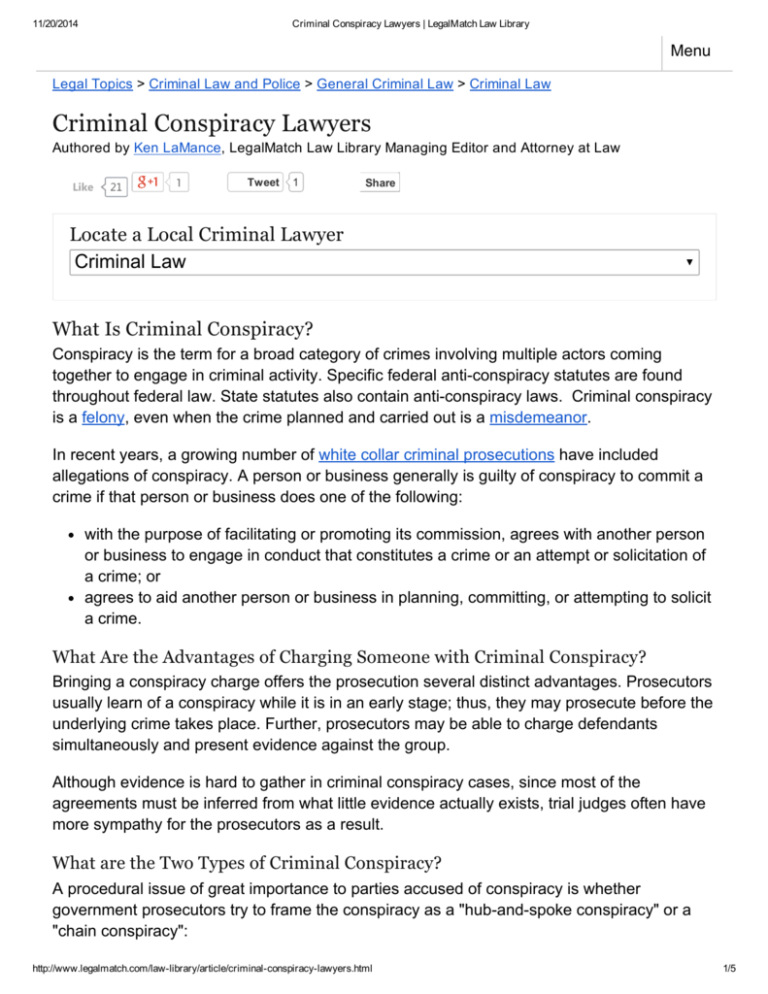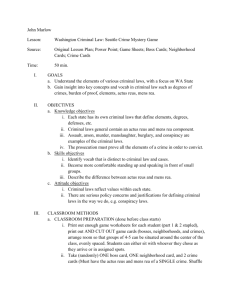
11/20/2014
Criminal Conspiracy Lawyers | LegalMatch Law Library
Menu
Legal Topics > Criminal Law and Police > General Criminal Law > Criminal Law
Criminal Conspiracy Lawyers
Authored by Ken LaMance, LegalMatch Law Library Managing Editor and Attorney at Law
Like
21
1
Tweet
1
Share
Locate a Local Criminal Lawyer
Criminal Law
What Is Criminal Conspiracy?
Conspiracy is the term for a broad category of crimes involving multiple actors coming
together to engage in criminal activity. Specific federal anti­conspiracy statutes are found
throughout federal law. State statutes also contain anti­conspiracy laws. Criminal conspiracy
is a felony, even when the crime planned and carried out is a misdemeanor.
In recent years, a growing number of white collar criminal prosecutions have included
allegations of conspiracy. A person or business generally is guilty of conspiracy to commit a
crime if that person or business does one of the following:
with the purpose of facilitating or promoting its commission, agrees with another person
or business to engage in conduct that constitutes a crime or an attempt or solicitation of
a crime; or
agrees to aid another person or business in planning, committing, or attempting to solicit
a crime.
What Are the Advantages of Charging Someone with Criminal Conspiracy?
Bringing a conspiracy charge offers the prosecution several distinct advantages. Prosecutors
usually learn of a conspiracy while it is in an early stage; thus, they may prosecute before the
underlying crime takes place. Further, prosecutors may be able to charge defendants
simultaneously and present evidence against the group.
Although evidence is hard to gather in criminal conspiracy cases, since most of the
agreements must be inferred from what little evidence actually exists, trial judges often have
more sympathy for the prosecutors as a result.
What are the Two Types of Criminal Conspiracy?
A procedural issue of great importance to parties accused of conspiracy is whether
government prosecutors try to frame the conspiracy as a "hub­and­spoke conspiracy" or a
"chain conspiracy":
http://www.legalmatch.com/law­library/article/criminal­conspiracy­lawyers.html
1/5
11/20/2014
Criminal Conspiracy Lawyers | LegalMatch Law Library
In a hub­and­spoke conspiracy, many parties conspire with one person, but not with
other defendants. It is advantageous for a defendant to have its actions characterized as
part of a hub­and­spoke conspiracy; because that means that the conspiracies are
separate and disconnected.
A chain conspiracy involves several parties as links in one long criminal chain.
Defendants in chain conspiracies are responsible for the actions of all participants in the
chain, even if they never met some of the other participants in the chain.
What Elements Are Needed to Prove Criminal Conspiracy?
The two key elements in proving a conspiracy are an agreement and an act in furtherance of
the conspiracy by one of the actors:
A key element in prosecuting a defendant for conspiracy is proving the agreement. The
agreement that forms the basis for conspiracy need not be written, oral, or even explicit,
but is often inferred from the facts of the specific case. If the parties meet and reach an
understanding to work for a common purpose, there is an agreement.
Most criminal conspiracy statutes also require that at least one of the parties has
committed an overt act in furtherance of the conspiracy.
What Are the Two Types of Criminal Conspiracy?
A procedural issue of great importance to parties accused of conspiracy is whether
government prosecutors try to frame the conspiracy as a "hub­and­spoke conspiracy" or a
"chain conspiracy":
In a hub­and­spoke conspiracy, many parties conspire with one person, but not with
other defendants. It is advantageous for a defendant to have its actions characterized as
part of a hub­and­spoke conspiracy; because that means that the conspiracies are
separate and disconnected.
A chain conspiracy involves several parties as links in one long criminal chain.
Defendants in chain conspiracies are responsible for the actions of all participants in the
chain, even if they never met some of the other participants in the chain.
What Kind of Evidence Is Needed to Prove Criminal Conspiracy?
As mentioned earlier, proving criminal conspiracy is often difficult because there is little
physical evidence of agreement between persons if there is no contract. The criminals would
have to be extraordinary stupid to create a written or otherwise physical contract to commit a
crime.
The best type of evidence, therefore, is a confession by one or more of the suspects. If such
a confession isn’t produced, prosecutors must do their best to infer agreement from the
circumstances. The first inference is one of vested interest: if a defendant has an interest in
seeing the crime committed, then a jury could infer that the defendant could agree to commit
the crime. The interest inferred is usually a monetary one.
http://www.legalmatch.com/law­library/article/criminal­conspiracy­lawyers.html
2/5
11/20/2014
Criminal Conspiracy Lawyers | LegalMatch Law Library
The second inference is if the defendant had no legitimate reason for aiding the criminals
beyond being involved in the crime. This type of inference is usually made in cases where
one conspirator supplies the other conspirator(s) with the materials needed to commit the
crime. For example, there is no legitimate reason for a bank teller to give “customers” a map
of the bank’s vaults unless the “customers” were planning on robbing the bank later.
Are There Any Possible Defenses to a Criminal Conspiracy Charge?
Due to the definition of the crime and the elements which must be proven, criminal
conspiracy contains a number of defenses, some of which are unique to the crime:
Lack of evidence: This might be a no­brainer, but prosecutors must provide evidence
beyond that of mere association. Just because a suspect is linked to or knows another
suspect is not enough to provide that there was a plan to commit a crime.
All or Nothing: Since conspiracy depends on an agreement existing between the
suspects of the group, if the prosecution fails to show that any suspect in the group
made an overt act towards completing the crime, the entire group can get off.
Specificity over Generality: Many states have doctrines stating that if a suspect can be
charged with both a specific crime and a general crime using the same evidence, only
the specific crime can be charged.
This is helpful in conspiracy cases involving misdemeanors because conspiracy statutes are
always drawn very broadly. Invoking the specificity doctrine could allow a defendant to
escape the felony charge (conspiracy) and serve a misdemeanor sentence instead.
Should I Contact a Lawyer?
Criminal conspiracy is a complicated criminal charge that involves several complicated legal
theories. If you have been accused of or arrested for criminal conspiracy, you may find the
advice of a criminal defense attorney to be helpful in solving your legal problems.
Consult a Lawyer ­ Present Your Case Now!
Last Modified: 07­30­2014 12:45 PM PDT
Find the Right Lawyer Now
Link to this page
http://www.legalmat
ch.com/law‐
library/article/cri
Law Library Disclaimer
minal‐conspiracy‐
lawyers.html
http://www.legalmatch.com/law­library/article/criminal­conspiracy­lawyers.html
3/5
11/20/2014
Criminal Conspiracy Lawyers | LegalMatch Law Library
Law Library
Business Law
Criminal Law and Police
Family Law
Finance Law
Government Law
Immigration Law
Injury or Health Law
Intellectual Property Law
Job or Employment Law
Products and Services Law
Property and Housing Law
Related Articles:
Right to an Appeal
Preliminary Hearing Lawyers
Diversionary Programs
Plea Bargain Lawyers
Civil Conspiracy
Criminal Punishments
Rights of Prisoners
Miranda Lawyer
Cyberbullying
Police Questioning After an Arrest
Criminal Sentence Modification
Criminal Defenses
Helping a Criminal Lawyer
Criminal Attempt Lawyers
http://www.legalmatch.com/law­library/article/criminal­conspiracy­lawyers.html
4/5
11/20/2014
Criminal Conspiracy Lawyers | LegalMatch Law Library
Better Business Bureau Online Reliability
Copyright 1999­2014 LegalMatch. All rights reserved. LegalMatch®, the LegalMatch logo, and the tradedress are
trademarks of LegalMatch. Patents Pending.
User Agreement
Privacy Policy Site Map
http://www.legalmatch.com/law­library/article/criminal­conspiracy­lawyers.html
5/5






